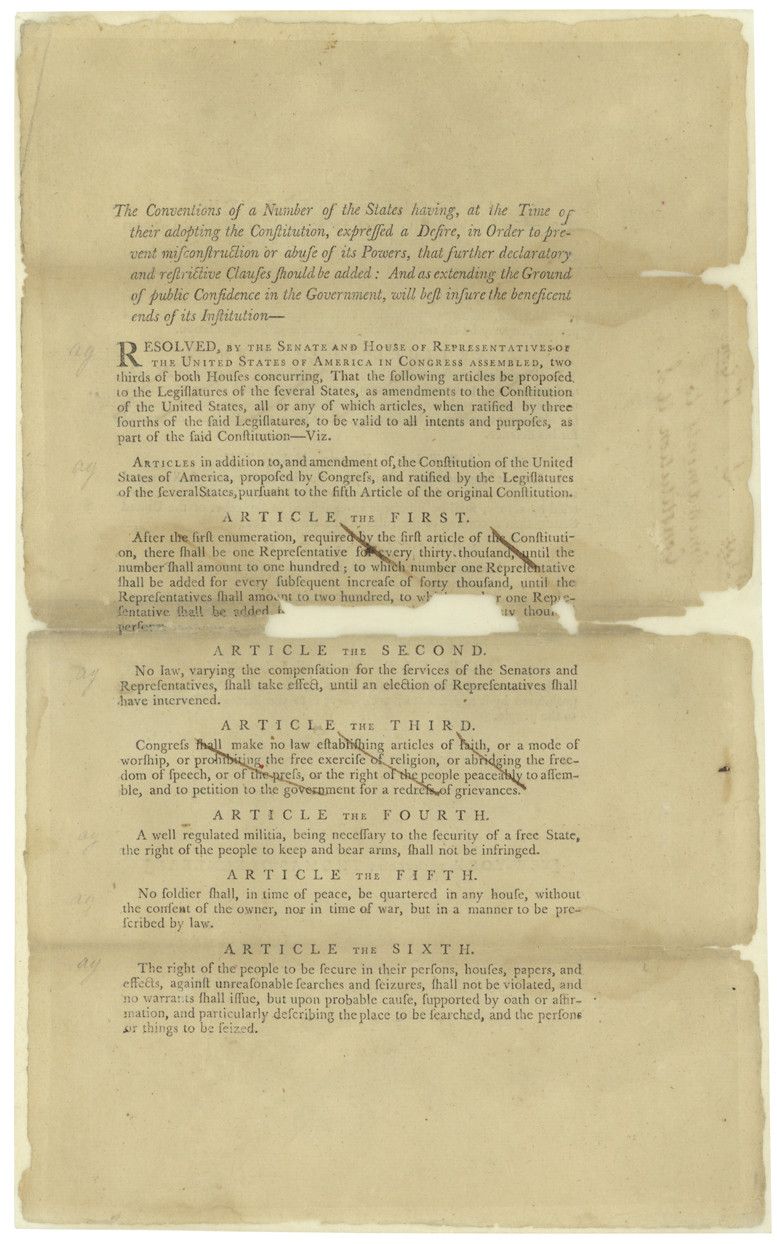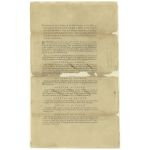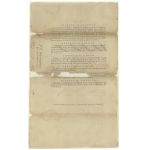Proposed Amendments to the Constitution as Passed by the Senate
9/14/1789
Add to Favorites:
Add all page(s) of this document to activity:

Add only page 1 to activity:
Add only page 2 to activity:
On June 8, 1789, Representative James Madison of Virginia introduced a series of proposed amendments to the newly ratified U.S. Constitution. That summer the House of Representatives debated the issue and on August 24 passed 17 proposed constitutional amendments. The Senate then took up the matter — they altered and consolidated the House amendments into 12.
This printed document reflects the Senate's changes as passed on September 14, 1789. The line-outs on the first, third, and eighth articles indicate wording that had been amended in conference committee on September 24, 1789. Twelve articles of amendment were then sent to the states — articles three through twelve were ratified and became the Bill of Rights in 1791.
This printed document reflects the Senate's changes as passed on September 14, 1789. The line-outs on the first, third, and eighth articles indicate wording that had been amended in conference committee on September 24, 1789. Twelve articles of amendment were then sent to the states — articles three through twelve were ratified and became the Bill of Rights in 1791.
Transcript
The Conventions of a Number of the States having, at the Time of their adopting the Constitution, expressed a Desire, in Order to prevent misconstruction or abuse of its Powers, that further declaratory and restrictive Clauses should be added: And as extending the Ground of public Confidence in the Government, will best insure the beneficent ends of the Institution-RESOLVED, BY THE SENATE AND HOUSE OF REPRESENTATIVES OF THE UNITED STATES OF AMERICA IN CONGRESS ASSEMBLED, two thirds of both Houses concurring, That the following article be proposed to the Legislatures of the several States, as amendments to the Constitution of the United States, all or any of which articles, when ratified by three fourths of the said Legislatures, to be valid to all intents and purposes, as part of the said Constitution -Viz.
ARTICLES in addition to, and amendment of, the Constitution of the United States of America, proposed by Congress, and ratified by the Legislatures of the several States, pursuant to the fifth Article of the original Constitution.
[crossed out]
ARTICLE THE FIRST.
After the first enumeration, required by the first article of the Constitution, there shall be one Representative for every thirty thousand, until the number shall amount to one hundred: to which number one Representative shall be added for every subsequent increase of forty thousand, until the Representatives shall amount to two hundred to [text missing] one Representative shall be added [text missing].
ARTICLE THE SECOND.
No law, varying the compensation for the service of the Senators and Representatives, shall take effect, until an election of Representatives shall have intervened.
[crossed out]
ARTICLE THE THIRD.
Congress shall make no law establishing articles of faith, or a mode of worship, or prohibiting the free exercise of religion, or abridging the freedom of speech, or of the press, or the right of the people peaceably to assemble, and to petition to the government for a redress of grievances.
ARTICLE THE FOURTH
A well regulated militia, being necessary to the security of a free State, the right of the people to keep and bear arms, shall not be infringed.
ARTICLE THE FIFTH
No soldier shall, in time of peace, be quartered in any house, without the consent of the owner, nor in time of war, but in a manner to be prescribed by law.
ARTICLE THE SIXTH.
The right of the people to be secure in their persons, houses, papers, and effects, against unreasonable searches and seizures, shall not be violated, and no warrants shall issue, but upon probable cause, supported by oath or affirmation, and particularly describing the place to be searched and the person or things to be seized.
[2]
ARTICLE THE SEVENTH
No person shall be held to answer for a capital, or otherwise infamous crime, unless on a presentment or indictment of a Grand Jury, except in cases arising in the land or naval forces, or in the militia, when in actual service in time of war or public danger, nor shall any person be subject for the same offense to be twice put in jeopardy of life or limb; nor shall be compelled in any criminal case, to be a witness against himself, nor be deprived of life, liberty or property, without due process of law; nor shall private property be taken for public use without just compensation.
[crossed out]
ARTICLE THE EIGHTH
In all criminal prosecutions, the accused shall enjoy the right to a speedy and public trial, to be informed of the nature and causee of the accusation, to be confronted with the witnesses against him, to have compusory process for obtaining witnesses in his favour, and to have the assistance of counsel for his defence.
ARTICLE THE NINTH
In suits at common law, where the value in controversy shall exceed twenty dollars, the right of trial by Jury shall be preserved, and no fact, tried by a Jury, shall be otherwise re-examined in any court of the United States, than according to the rules of the common law.
ARTICLE THE TENTH
Excessive bail shall not be required, nor excessive fines imposed, nor cruel and unusual punishments inflicted.
[text missing] ARTICLE THE ELEVENTH.
[text missing] shall not be construed to deny or disparage others retained by the people.
ARTICLE THE TWELFTH
The powers not delegated to the united States by the Constitution, nor prohibited by it to the States, are reserved to the States respectively, or to the people.
[NEW YORK, PRINTED BY THOMAS GREENLEAF.]
[left hand side written vertically] 1st Sess. 1st Con: Amendments to Constitution U.S.
This primary source comes from the Records of the U.S. Senate.
National Archives Identifier: 2173242
Full Citation: Proposed Amendments to the U.S. Constitution as Passed by the Senate, Printed September 14, 1789; 9/14/1789; Bills and Resolutions Originating in the House and Considered in the Senate during the 1st Congress; (SEN1A-C1); Bills and Resolutions Originating in the House and Considered in the Senate, 1789 - 2002; Records of the U.S. Senate, Record Group 46; National Archives Building, Washington, DC. [Online Version, https://docsteach.org/documents/document/proposed-amendments, April 26, 2024]Rights: Public Domain, Free of Known Copyright Restrictions. Learn more on our privacy and legal page.





